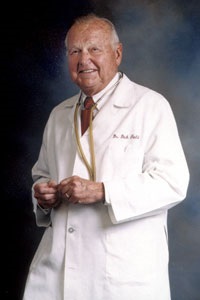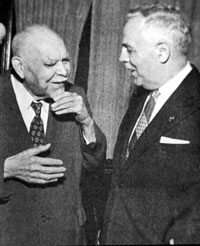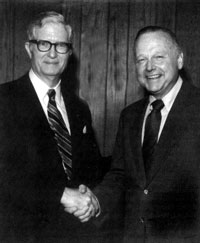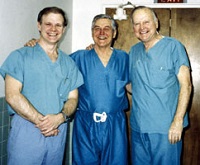- SOM
- Departments and Offices
- SOM Departments
- Surgery
- Residents
- Resources
- About Surgery at UMMC
About Surgery at UMMC
- Department of Surgery Home
- About Us
- Specialties
- Residents
- Fellows
Richard Jennings Field Jr. Lectureship
The presentation was made Feb. 8, 2002, by William W. Turner Jr., MD, James D. Hardy Professor and Chair of the Department of Surgery.
 This lectureship honors Dr. Richard Jennings Field Jr., a Clinical Professor of Surgery in the Department of Surgery since 1965. Dr. Field's roots are in Centreville, MS, where his grandparents settled in the late 19th century. His father, Dr. Jennings Field, also grew up in Centerville, attended Tulane Medical School, where he trained under the legendary Rudolph Matas, and returned home to practice in Centreville. He opened the Field Clinic the year that electric power came to Centreville. With his brother, Dr. Sam Field, he founded the first hospital in Centreville in 1928.
This lectureship honors Dr. Richard Jennings Field Jr., a Clinical Professor of Surgery in the Department of Surgery since 1965. Dr. Field's roots are in Centreville, MS, where his grandparents settled in the late 19th century. His father, Dr. Jennings Field, also grew up in Centerville, attended Tulane Medical School, where he trained under the legendary Rudolph Matas, and returned home to practice in Centreville. He opened the Field Clinic the year that electric power came to Centreville. With his brother, Dr. Sam Field, he founded the first hospital in Centreville in 1928.
Young Dick Field left Centreville to enter Tulane University during World War II as a part of the Navy's V-12 program. Dr. Field completed an internship at the Medical College of Virginia in Richmond, and then went on active duty with the Navy with postings at the Portsmouth and Philadelphia Naval Shipyards and Jacksonville, FL. Upon completion of his military service, he became a resident in Obstetrics and Gynecology under Dr. Conrad Collins at Tulane in 1952.
That lasted a year. Dr. Alton Ochsner accepted Dr. Field into the surgery residency. The surgery residency at Tulane was internationally famous, having been led by two giants in surgery, Drs. Rudolph Matas and Alton Ochsner.
 After completion of his surgery residency at Tulane, Dr. Field spent six months at the Lahey Clinic in Boston under the tutelage of Dr. Richard Cattell. Dr. Field returned to Centreville in 1956 to begin practice with his father and his uncle. Their reputations having stimulated demand for medical services, the Drs. Jennings and Sam Field's patients had overrun their first hospital, and it had been replaced by a new hospital in 1952. This was the setting in which Dr. Dick Field began to practice surgery. He not only brought new training and innovative ideas about surgery to Centerville, but he also sought to connect his life in Centreville to regional and national organizations.
After completion of his surgery residency at Tulane, Dr. Field spent six months at the Lahey Clinic in Boston under the tutelage of Dr. Richard Cattell. Dr. Field returned to Centreville in 1956 to begin practice with his father and his uncle. Their reputations having stimulated demand for medical services, the Drs. Jennings and Sam Field's patients had overrun their first hospital, and it had been replaced by a new hospital in 1952. This was the setting in which Dr. Dick Field began to practice surgery. He not only brought new training and innovative ideas about surgery to Centerville, but he also sought to connect his life in Centreville to regional and national organizations.
Dr. Field became a fellow of the American College of Surgeons in 1959, and he began a career of service to the College which included heading the Mississippi Trauma Committee, serving as regional chairman of the ACS National Trauma Committee, and serving as Mississippi's representative on the Board of Governors. Dr. Field's work at organizing trauma care in Mississippi, in serving on the Board of Governors, and in focusing interest on issues affecting rural surgery caught the attention of the leadership of the American College of Surgeons. In 1984, Dr. Field became a Regent of the College, and he served in that position for nine years.
Dr. Field and Dr. James D. Hardy, the first professor of surgery at the University of Mississippi School of Medicine, came to Mississippi within a year of each other. Dr. Field traveled to Jackson, and he introduced himself to Dr. Hardy, who made him a member of the clinical faculty.
Dr. Field also became a clinical professor in the departments of surgery at Tulane Medical School and LSU School of Medicine in New Orleans. Dr. Field established rotations in Centreville for medical students from all three medical schools at the Field Hospital and Clinic. Dr. Field also had medical students from the Mt. Sinai School of Medicine in New York.
 Students were attracted to the Field Clinic and Hospital by the increasingly convincing manner in which Dr. Field articulated the virtues of practicing medicine in a rural setting. He traveled throughout the country as a visiting lecturer.
Students were attracted to the Field Clinic and Hospital by the increasingly convincing manner in which Dr. Field articulated the virtues of practicing medicine in a rural setting. He traveled throughout the country as a visiting lecturer.
Through his national connections, Dr. Field has brought to Centreville the luminaries of American surgery. Dr. Field's leadership abilities have been recognized by the Southeastern Surgical Congress, for which he served as president and the Southern Surgical Association, for which he served as vice president. Dr. Field became the recognized spokesman in America when it came to inspiring and training young surgeons to pursue careers in rural surgery.
Dr. Field is a leader in his community, exemplifying the ideal of the caring physician. In his biography about Dr. Field entitled Dr. Dick, The Hands and Heart of a Rural Surgeon, Bob Pittman writes:
 "A rural surgeon requires an extra measure of concern and compassion if he is to stay the course, if he is to care enough to carry the community, if he is to be able to laugh, cry, care, comfort, counsel, and console, swinging from emotion to emotion with the coming and going of his friends who call themselves patients, with the coming and going of neighbors, kin, and even strangers who pass through his life and his hospital in a never ending stream."
"A rural surgeon requires an extra measure of concern and compassion if he is to stay the course, if he is to care enough to carry the community, if he is to be able to laugh, cry, care, comfort, counsel, and console, swinging from emotion to emotion with the coming and going of his friends who call themselves patients, with the coming and going of neighbors, kin, and even strangers who pass through his life and his hospital in a never ending stream."
Dr. Field is an example of what a difference a person can make when he pursues a dream that is based upon love of his fellow man, faith, determination, inquisitiveness and good cheer.


